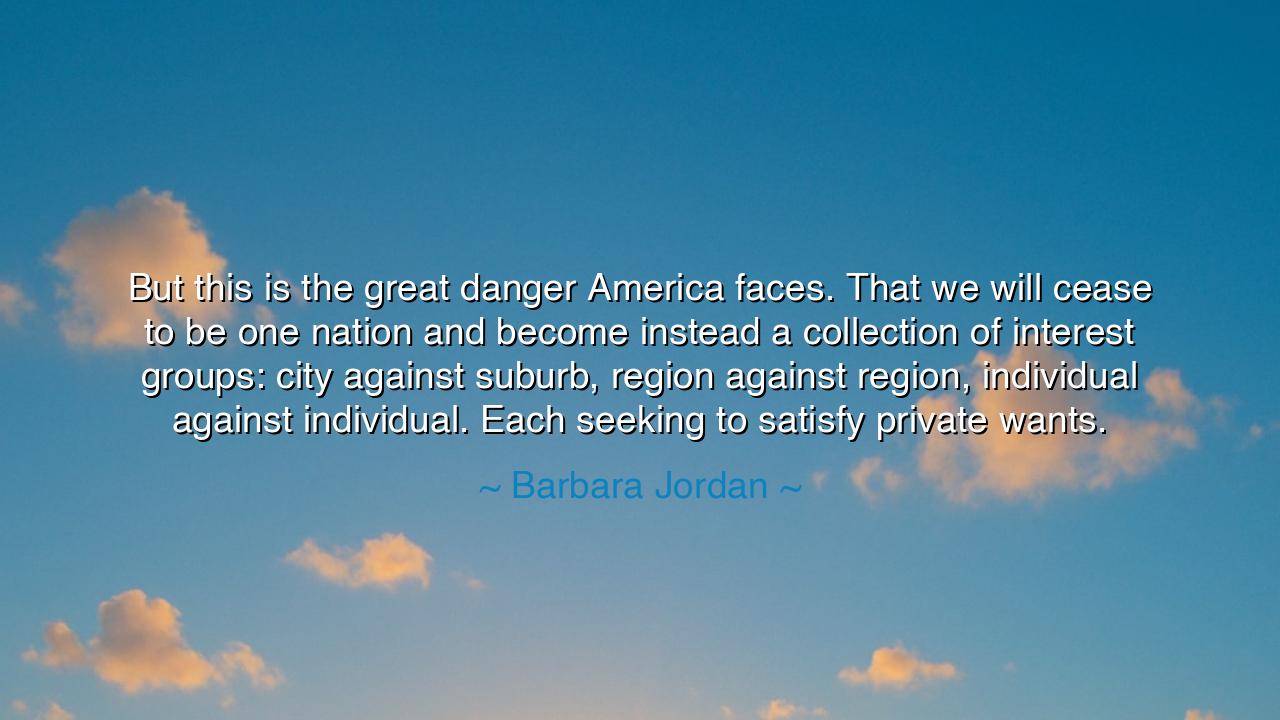
But this is the great danger America faces. That we will cease to
But this is the great danger America faces. That we will cease to be one nation and become instead a collection of interest groups: city against suburb, region against region, individual against individual. Each seeking to satisfy private wants.






“But this is the great danger America faces. That we will cease to be one nation and become instead a collection of interest groups: city against suburb, region against region, individual against individual. Each seeking to satisfy private wants.” Thus spoke Barbara Jordan, the mighty voice of justice and unity, whose words once echoed through the halls of Congress and the hearts of her people. In these lines, she revealed not merely a political warning, but a moral prophecy — that a nation without shared purpose dissolves, not by invasion from without, but by division from within. Her words burn with the wisdom of an age-old truth: that selfishness is the slow poison of civilization, and that only in unity can a people endure.
The origin of this quote lies in Jordan’s public life during the turbulent 1970s, a time when America’s faith in itself trembled. She was the first Black woman from the South elected to the U.S. Congress, and her voice carried the moral force of both history and hope. During the Watergate hearings, and again in her later speeches, she spoke of the danger of corruption — not only in leaders, but in the hearts of citizens who put private gain above the common good. Her warning was not confined to her era; it was a call to every generation: that democracy dies not when enemies attack its walls, but when its citizens forget they belong to one another.
In her words, Barbara Jordan paints a vivid image of fragmentation — city against suburb, region against region, individual against individual. This, she says, is the great danger: the loss of oneness, the unraveling of the national spirit into a thousand competing desires. When every group seeks only its own advantage, the sacred idea of a common good vanishes. The house divided cannot stand, for its foundation — trust, empathy, shared sacrifice — crumbles beneath the weight of greed. What she foresaw was not simply political polarization, but a deeper moral fracture, where unity gives way to isolation, and cooperation is replaced by endless contention.
This peril has echoed throughout history. The Roman Republic, once the pride of the ancient world, fell not because of foreign armies, but because of factionalism. Senators became servants of wealth, the people divided into mobs, and the idea of Rome — the idea of shared destiny — vanished. So too, in Jordan’s warning, America risks following that same path, trading the dream of “We the People” for the shouting of “me” and “mine.” She saw that liberty without solidarity becomes chaos, and freedom without virtue becomes tyranny of the strong over the weak.
Yet Jordan’s words are not only a warning — they are a call to action, a summons to rediscover the meaning of citizenship. She believed that a nation’s strength lies not in its wealth or its armies, but in the character of its people — their willingness to look beyond their own interests for the sake of justice and community. “Each seeking to satisfy private wants,” she said, is the root of decay. The cure, then, is public virtue — the deliberate choice to care for one another, to think not only of our rights, but of our responsibilities.
In her life, Barbara Jordan embodied this truth. Though she could have sought personal power or fame, she instead devoted herself to the principle of unity through service. Her speeches were not filled with hatred or partisanship, but with an unyielding belief in the potential of the American idea — that out of many, we may still become one. Her legacy is proof that greatness is not born of division, but of the courage to stand together even when the times pull us apart.
Therefore, O listener, take this teaching to heart. Guard yourself against the temptation to retreat into tribes of thought, to see only your reflection and forget the faces of your neighbors. Resist the easy anger that divides, and remember that the nation is not a collection of selves, but a community of souls. If America — or any people — is to endure, it must learn again the art of empathy, the discipline of compromise, and the joy of shared purpose.
Let this be your guide: seek not only what benefits you, but what uplifts all. For the true patriot is not he who shouts the loudest, but he who builds bridges where others build walls. Barbara Jordan’s words remind us that unity is not inherited; it must be renewed each generation by the labor of conscience. When we live for one another, the nation lives. But when we live only for ourselves, the nation dies — quietly, piece by piece.
So stand, children of the same earth, and remember: the great danger lies not in our enemies, but in our forgetting that we are one. Only by healing the divisions of the heart can a people fulfill its destiny. Only together can we preserve the fragile miracle of freedom.






AAdministratorAdministrator
Welcome, honored guests. Please leave a comment, we will respond soon